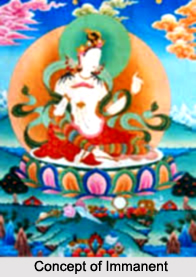 Concept of Immanent or as constituting the very soul of the objects of the world is not the explanation of tattva in Madhyamika. In fact the relation between the Absolute and phenomena is not made clear from the samviti point of view. Some critics consider this as a draw back in the Madhyamika conception of the Absolute. However, in the Astasahasrika Prajnaparamita, Subhuti, one of the major disciples of Buddha, declares, "From the very beginning, Subhuti the Elder, has been born after the image of the Tathagata`s Suchness. Because the Suchness of the Tathdgata and the Suchness of all dhannas is the same thing, and they are both the Suchness of Subhuti the Elder." In Yogacara, the Absolute is immanent in phenomena only in as much as the former is the reality, the substratum of the latter. However, the Ultimate Reality is not shown as pervading phenomena.
Concept of Immanent or as constituting the very soul of the objects of the world is not the explanation of tattva in Madhyamika. In fact the relation between the Absolute and phenomena is not made clear from the samviti point of view. Some critics consider this as a draw back in the Madhyamika conception of the Absolute. However, in the Astasahasrika Prajnaparamita, Subhuti, one of the major disciples of Buddha, declares, "From the very beginning, Subhuti the Elder, has been born after the image of the Tathagata`s Suchness. Because the Suchness of the Tathdgata and the Suchness of all dhannas is the same thing, and they are both the Suchness of Subhuti the Elder." In Yogacara, the Absolute is immanent in phenomena only in as much as the former is the reality, the substratum of the latter. However, the Ultimate Reality is not shown as pervading phenomena.
The immanence of the Ultimate Reality is highlighted in the Hevajra Tantra. The Innate is all-pervading (sarvavyapi). One`s own consciousness itself is nothing but the Innate (atmanah svacittasya sahajalaksanasya svarupam). The yogi is reminded of the fact that in all things there is the Supreme Principle and that he should conceive them in the light of the Supreme Principle. Hevajra Tantra states, "This knowledge is the very life breath of all living things and is the imperishable supreme. It is all-pervading and abides in all living bodies. It is truly the great life-breath and the world-pervader, existence, non-existence and anything else whatsoever originates from it.
The Yogaratnamala states that all things are characterised by Thusness (sarvadharmanam tathagatasvabhavatvat). Hevajra Tantra also states that even the inanimate world is pervaded by Suchness (tathata). It states, "Whatever exists, moving, or stationary, grass, shrubs, creepers etc., are all conceived of as the supreme principle which is one`s own very nature." "Bhagavan Vajradhara declares that all things, fixed or moving, are in truth identical with himself. Everything that exists is of the same nature when viewed from the principle of the Flavour of Essential Similarity (samarasa). By `samarasa` is meant the sphere of essential identity of essence. Vajradhara himself is the source of the whole universe. Vajradhara states that the world of objects {prapanca) is the differentiated aspect of the essentially undifferentiated Thusness. "For the yogi, form and whatever other objects of experience that manifests, are all pure in nature, for the world is pervaded by the Enlightened Nature. "This intrinsic nature is known as the Innate (sahaja) which is the one concealed Essence of all things (samvara). It is said, "...within the infinite phenomenal universe all things are of the same nature!" The yogi is exhorted to identify himself constantly with Hevajra who is the supreme identity present in all individuals. The deities of the mandala who are of the nature of sunyata are the various aspects of phenomenal existence. Hence all things are of one and the same nature. The Hevajra Tantra states that the Absolute is the intrinsic nature of all, as well as the source of all knowledge recounted by other philosophical traditions. The Ultimate Reality as Bliss pervades all things and the text states that there is no body without bliss, and so also there is no bliss without the body.
It is this conviction that all things, inanimate and animate, are essentially identical in essence, that enables the yogi to overcome his prejudices and the tendency to discriminate and differentiate. When the knowledge of the undifferentiated nature arises within the yogi, it is no longer possible for him to be obstructed by the misconception that he is distinct from the rest.
Hevajra Tantra states: "He should not offer gifts with thoughts of worthiness and unworthiness. He must eat and drink whatever he obtains and he should not hold any notions regarding likes and dislikes. The practitioner should not have thoughts regarding what is edible and inedible; similarly, he should not differentiate between what can or cannot be drunk and what should or should not be done".
The yogi overcomes the restrictions of caste and conceives the five castes unified as one. One who is in union with the intrinsic nature of all things is free from all social and religious injunctions and inhibitions. This conviction makes the yogi realise that all things are equal. The compassion (kipa) of the yogi finds its spring in this conviction of the essential equality of all beings. Kipa is the experience of oneself as being of the same nature as all living beings.




















